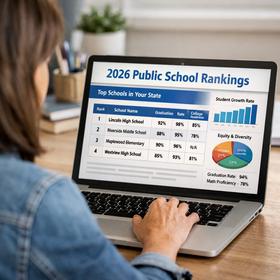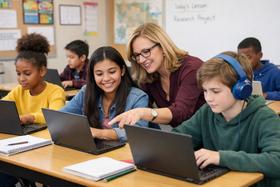Serving 490 students in grades Prekindergarten-5, George Washington Carver Elementary School ranks in the bottom 50% of all schools in Maryland for overall test scores (math proficiency is bottom 50%, and reading proficiency is bottom 50%).
The percentage of students achieving proficiency in math is 13% (which is lower than the Maryland state average of 27%). The percentage of students achieving proficiency in reading/language arts is 15-19% (which is lower than the Maryland state average of 45%).
The student-teacher ratio of 13:1 is lower than the Maryland state level of 14:1.
Minority enrollment is 86% of the student body (majority Black), which is higher than the Maryland state average of 68% (majority Black).
Quick Facts (2026)
- Grades: Prekindergarten-5
- Enrollment: 490 students
- Student-Teacher Ratio: 13:1
- Minority Enrollment: 86%
- Overall Testing Rank: Bottom 50% in MD
- Math Proficiency: 13% (Btm 50%)
- Reading Proficiency: 15-19% (Btm 50%)
- Science Proficiency: ≤5% (Btm 50%)
- Source: National Center for Education Statistics (NCES), MD Dept. of Education
Top Rankings
George Washington Carver Elementary School ranks among the top 20% of public schools in Maryland for:
Category
Attribute
Percent Eligible For Free Lunch
School Overview
George Washington Carver Elementary School's student population of 490 students has declined by 5% over five school years.
The teacher population of 39 teachers has stayed relatively flat over five school years.
Grades Offered
Grades Prekindergarten-5
(Supplemental Virtual)
(Supplemental Virtual)
Total Students
490 students
Gender %
Total Classroom Teachers
39 teachers
School Motto
Home of the Eagles!
School Rankings
George Washington Carver Elementary School ranks within the bottom 50% of all 1,338 schools in Maryland (based off of combined math and reading proficiency testing data).
The diversity score of George Washington Carver Elementary School is 0.67, which is less than the diversity score at state average of 0.74. The school's diversity has stayed relatively flat over five school years.
Overall Testing Rank
#1102 out of 1338 schools
(Bottom 50%)
(Bottom 50%)
Math Test Scores (% Proficient)
13%
27%
Reading/Language Arts Test Scores (% Proficient)
15-19%
45%
Science Test Scores (% Proficient)
≤5%
36%
Student-Teacher Ratio
13:1
14:1
American Indian
n/a
n/a
Asian
1%
7%
Hispanic
26%
23%
Black
49%
33%
White
14%
32%
Hawaiian
n/a
n/a
Two or more races
10%
5%
All Ethnic Groups
Participates in the National School Lunch Program (NSLP)
Yes
Eligible for Free Lunch
72%
44%
Eligible for Reduced Lunch
7%
5%
School Statewide Testing
School District Name
Source: National Center for Education Statistics (NCES), MD Dept. of Education
School Notes
- School Mascot: Eagles
Frequently Asked Questions
What is George Washington Carver Elementary School's ranking?
George Washington Carver Elementary School is ranked #1102 out of 1,338 schools, which ranks it among the bottom 50% of public schools in Maryland.
What schools are George Washington Carver Elementary School often compared to?
George Washington Carver Elementary Schoolis often viewed alongside schools like Lexington Park Elementary School, Chesapeake Charter School by visitors of our site.
What percent of students have achieved state testing proficiency in math and reading?
13% of students have achieved math proficiency (compared to the 27% MD state average), while 15-19% of students have achieved reading proficiency (compared to the 45% MD state average).
How many students attend George Washington Carver Elementary School?
490 students attend George Washington Carver Elementary School.
What is the racial composition of the student body?
49% of George Washington Carver Elementary School students are Black, 26% of students are Hispanic, 14% of students are White, 10% of students are Two or more races, and 1% of students are Asian.
What is the student-teacher ratio of George Washington Carver Elementary School?
George Washington Carver Elementary School has a student ration of 13:1, which is lower than the Maryland state average of 14:1.
What grades does George Washington Carver Elementary School offer ?
George Washington Carver Elementary School offers enrollment in grades Prekindergarten-5 (Supplemental Virtual).
What school district is George Washington Carver Elementary School part of?
George Washington Carver Elementary School is part of St. Mary's County Public Schools.
School Reviews
Review George Washington Carver Elementary School. Reviews should be a few sentences in length. Please include any comments on:
- Quality of academic programs, teachers, and facilities
- Availability of music, art, sports and other extracurricular activities
Recent Articles

Public School Rankings: Are They Accurate in 2026?
Are public school rankings accurate? Learn how rankings are calculated in 2026, what they miss, and how families can evaluate schools wisely.

How Are U.S. Public Schools Doing in 2026?
A 2026 update on how U.S. public schools are performing academically, financially, and socially in a post-pandemic era.

Helping Your Child Navigate Friendship Drama at School
Meta Description: Practical 2026 strategies for helping your child navigate friendship drama at school with confidence, empathy, and resilience.





